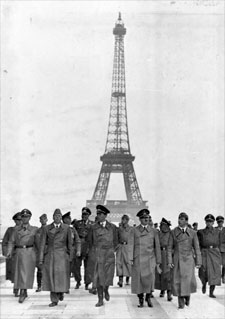“Blitzkriegs” 1939–1940
Hitler had long planned and prepared and, once the German-Soviet Nonaggression Pact had been signed in August of 1939, skillfully orchestrated the war to conquer “Lebensraum” or living space in the East, which was started by the dictator with the invasion of Poland on September 1, 1939.
Attacked by the Soviet Union as well on September 17, Poland suffered defeat five weeks into the German invasion. Poland ceased to exist as a state and was “partitioned”: Parts were incorporated directly in the German Reich, eastern Polish territories went to the Soviet Union and the remaining “rump state” was occupied by Germany and called the “Generalgouvernement”.
During the hostilities and the subsequent period of occupation, the German occupiers treated the civilian population brutally and ruthlessly, murdering the elite, deporting residents of annexed territories to the Generalgouvernement and establishing Jewish ghettos.
The attack on Poland commenced the series of “blitzkriegs” in which the German Wehrmacht achieved military successes in rapid succession. German troops occupied Denmark and Norway in April of 1940. They occupied the Benelux States in May of 1940 and then attacked France. The capture of Paris on June 14, 1940 and victory over Germany’s “traditional enemy” France one week later especially signified a triumph for Hitler. In the summer of 1940, he had himself celebrated as the “greatest commander of all times” and had reached the peak of his popularity.
Great Britain was the next target of Nazi aggression. The German Luftwaffe started flying sorties against London and a number of other centers of the arms industry in mid-August of 1940. The Germans were met with fierce resistance, however, and, after substantial losses, the regime had to abandon its invasion of Great Britain, which had been prepared for the spring of 1941. Hitler’s plan to secure his rear for the planned attack on the Soviet Union by defeating England had thus been thwarted.

